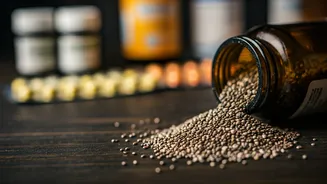Digestive Sensitivity Warning
People with sensitive digestive systems should be mindful. Chia seeds are high in fiber, which can be beneficial, but it might trigger issues like bloating,
gas, or stomach cramps for those with delicate digestive tracts. Starting with small amounts is key. This approach allows your body to adjust to the increased fiber intake gradually, minimizing any adverse reactions. Listen to your body and adjust your chia seed consumption accordingly. If you have pre-existing digestive disorders, consider consulting a healthcare professional before including chia seeds in your diet.
Blood Thinning Concerns
Individuals on blood-thinning medications need to be extremely cautious. Chia seeds can have blood-thinning effects. This combination could amplify the effects of medications like warfarin or aspirin, potentially increasing the risk of bleeding. If you are taking blood thinners, consult your doctor. They can provide personalized advice on how to integrate chia seeds safely into your diet, or whether it's best to avoid them altogether. Regular monitoring of your blood and the medication dosage might be necessary to ensure safety and well-being. It is important to remember that these tiny seeds can interact with potent medications.
Allergy Alert
Those with known allergies to chia seeds or related foods should steer clear. Allergic reactions can vary from mild symptoms like skin rashes or itching to severe ones such as difficulty breathing or anaphylaxis. It is crucial to be aware of any signs of allergic reactions when trying chia seeds for the first time. Start with a very small amount to assess your body's response. If you notice any allergic reactions, immediately stop consumption and seek medical assistance. Always read the ingredient labels of food products to check for hidden sources of chia seeds, and always consult with a doctor.
Diabetes Considerations
People with diabetes should also be prudent. Chia seeds can affect blood sugar levels, and might interact with diabetes medications. Chia seeds may help regulate blood sugar levels, it is very important to monitor your blood sugar regularly. It is crucial to consult your healthcare provider about how chia seeds could impact your diabetes management plan. Your doctor can help determine the right amount of chia seeds to consume, based on your specific health conditions. Additionally, your medication dosage might need adjustments, so collaboration with a medical professional is key.
Swallowing Difficulties
Individuals with swallowing difficulties or conditions like dysphagia should exercise caution. Chia seeds readily absorb water and expand, which could pose a choking hazard for those with swallowing problems. It is recommended to thoroughly soak chia seeds before consumption to soften them, or to avoid them altogether. The altered consistency will make the seeds easier to consume and reduce the risk of choking. If you have trouble swallowing, it's wise to consult with a speech therapist or your doctor. They can give tailored guidance on food textures and safety when eating.





















